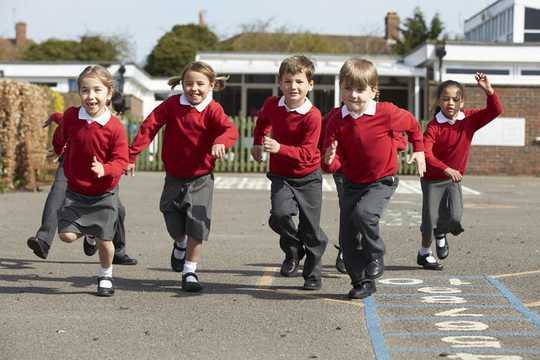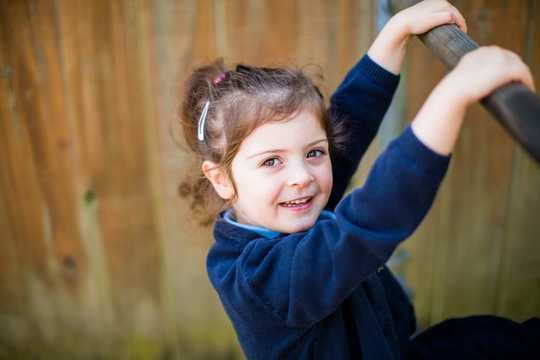
Monkey Business Images/Shutterstock
Afternoon breaks were once a common feature of nearly all primary school timetables. But, as schools have sought to dedicate more time to teaching and learning, and limit poor behaviour, these short play times have been cut down and, in many cases, eliminated altogether.
But research has shown that play is important for a child’s development – and now a new analysis from our ongoing research project has found that removing afternoon break time could be detrimental to pupils’ physical well-being.
As young childrens’ screen time increases at home, school is becoming the main and – in some cases only – place where pupils have the opportunity to be active with friends. Arguably, we should be valuing all breaks as an essential part of child development and the school day.
For our recent study, we worked with 5,232 pupils from 56 primary schools in Wales that take part in our HAPPEN project (Health and Attainment of Pupils in a Primary Education Network). Under this scheme we examine all aspects of child health and well-being. We asked the children about their afternoon breaks to look deeper into whether having one or not can affect different aspects of their health.
We found that 1,413 of the children (27%) did not have an afternoon play time, and that more deprived children were the least likely to have an afternoon break (based on their home postcode). Interestingly, children in the most affluent areas were also less likely to have this break time too – 36% of the most deprived, 17%-20% of the middle group, and 28% of the least deprived children did not have afternoon play.
We also found that children who had afternoon play were significantly fitter. Both boys and girls could run further and do more shuttles in a bleep test (even after we adjusted for deprivation level). This suggests that removing afternoon play for children may be detrimental to their physical health.

Play time. Rosie Parsons/Shutterstock
Attainment and behaviour
Though afternoon break is often removed to focus more on teaching and learning, we found no evidence that giving children an afternoon break led to lower attainment in maths and English at Key Stage 2. In fact, 3% more boys who had afternoon play achieved their Key stage 2, although this is not statistically significant. There was no difference for girls.
However, we did find that children who have an afternoon break were more likely to self-report behavioural problems such as hitting out, getting very angry, breaking things on purpose and emotional difficulties such as feeling lonely, nobody likes me, feeling shy or angry. Other researchers have found the same thing and, as mentioned above, poor behaviour is one of the main reasons why schools remove afternoon play.
This finding suggests that break times may also be a time when children argue or fight with friends, and may lead to them experiencing difficult emotions. Indeed, when we asked children in another HAPPEN survey what they would change to make themselves healthier and happier, they said “stopping arguments” and “getting along” with each other was important to them. But it is important to note that one of the most common responses to this question was that children would like more time and space to play and feel safe.
Rather than simply removing play for children, perhaps greater planning and consideration is needed at school level to deal with relationships during play, as this type of interaction is important for children’s broader social development. Some have argued that supervision by a play worker rather than a teacher is needed. Otherss have called for a greater variety of activities to be made available during breaks, not just unstructured play. But, while efforts are being directed at making play an important time to increase physical activity, it is important that a positive social environment is created during play time too.
If these breaks are to be given in more schools, more support is needed to help schools ensure that play is meaningful, inclusive and encouraging of positive social relationships. Perhaps afternoon play times are the perfect time for independent outdoor learning activities. This could help children gain the benefits of better physical health – and perhaps help deal with some of the difficulties associated with afternoon play.![]()
About the Authors
Sinead Brophy, Professor in Public Health Data Science, Swansea University; Charlotte Todd, Research Assistant in Child Health and Well-being, Swansea University; Emily Marchant, PhD Researcher in Medical Studies, Swansea University, and Michaela James, Research Assistant in Childhood Physical Activity, Swansea University
This article is republished from The Conversation under a Creative Commons license. Read the original article.
Books on Exercise from Amazon's Best Sellers list
The Four-Pack Revolution: How You Can Aim Lower, Cheat on Your Diet, and Still Lose Weight and Keep It Off
by Chael Sonnen and Ryan Parsons
The Four-Pack Revolution presents a total-life approach for attaining health and fitness goals without the hard work and suffering.
Click for more info or to order
Bigger Leaner Stronger: The Simple Science of Building the Ultimate Male Body
by Michael Matthews
If you want to build muscle, lose fat, and look great as quickly as possible without steroids, good genetics, or wasting ridiculous amounts of time in the gym and money on supplements, then you want to read this book.
Click for more info or to order
The Women's Health Big Book of Exercises: Four Weeks to a Leaner, Sexier, Healthier You!
by Adam Campbell
The Women's Health Big Book of Exercises is the essential workout guide for anyone who wants a better body. As the most comprehensive collection of exercises ever created, this book is a body-shaping power tool for both beginners and longtime fitness buffs alike.
Click for more info or to order
Bodyweight Strength Training Anatomy
by Bret Contreras
In Bodyweight Strength Training Anatomy, author and renowned trainer Bret Contreras has created the authoritative resource for increasing total-body strength without the need for free weights, fitness machines, or even a gym.
Click for more info or to order
The Men's Health Big Book of Exercises: Four Weeks to a Leaner, Stronger, More Muscular You!
by Adam Campbell
The Men's Health Big Book of Exercises is the essential workout guide for anyone who wants a better body. As the most comprehensive collection of exercises ever created, this book is a body-shaping power tool for both beginners and longtime fitness buffs alike.

























